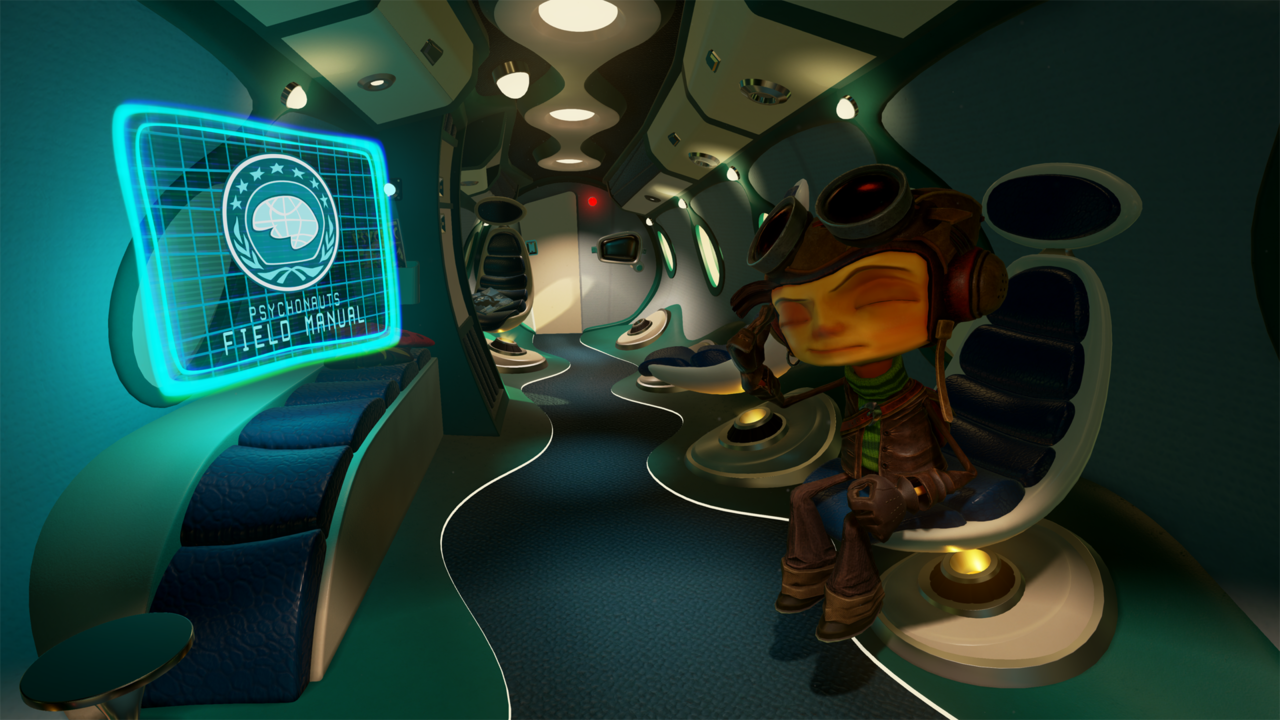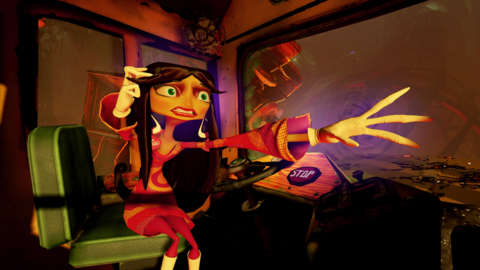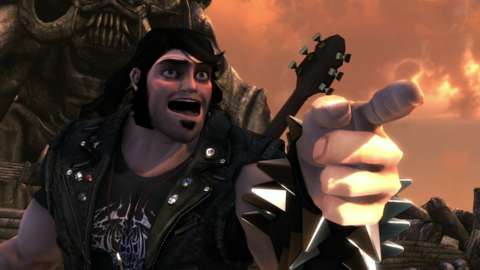Double Fine's Psychonauts bred positivity and understanding because of its ability to help players empathize with the thoughts and motivations of its characters. The series' upcoming PlayStation VR-exclusive spin-off, Psychonauts in the Rhombus of Ruin, looks to do the same thing in a new way by utilizing the immersive capabilities of VR.
The game puts you in control of series protagonist Raz as he embarks on a mission to rescue the grand head of the Psychonauts, Truman Zanotto. It mixes the vibrant charm of Psychonaut's universe with puzzle-solving elements reminiscent of Double Fine CEO Tim Schafer's earlier work on point-and-click adventure games like Day of the Tentacle and Full Throttle. The game also helps you understand the inner workings of its characters through small, humorous experiences. While recently playing the game, I noticed what seemed like a studious, serious henchmen studying a manual. But in actuality, he was just reading a comic book he'd hidden inside it. Check the video above for more impressions about the game.
I recently got the opportunity to talk to Schafer and Rhombus of Ruin project lead Chad Dawson about the Psychonauts series, their studio's mentality on making the world a better place through positivity, and the possibility of developing Brutal Legend 2.
GameSpot: First off, what is it about Psychonauts that you feel resonates so much with people? And why does it resonate so much with you as creators as well?
Tim Schafer: For me, I always liked the idea of going into people's brains. The mystery of how we translate our emotions into dreamlike images in our heads is such a fascinating way to think about people, and empathize with them and their problems. By the time we were done creating those characters, from their original concepts to eventually what the artists and actors brought to them, they ended up being so memorable.

I have such a strong affinity for Raz, Lilli, Sasha, Milla, and all those kids from the first game. But it seems people share in that affinity too. If you talk to all the voice actors that worked on the game, they'll often tell you, "I've done a lot of voices in my career, but every time I go to a convention, people always want to know about Raz, Lilli, Dogen, etc." At the end of the day, we did our best to make the game's cast feel real, and whenever you invest a lot of time into making a character and treat them like a real person, I think they stick more with the audience.
Psychonauts in the Rhombus of Ruin is a direct continuation to Psychonauts 1. I'm curious, why wasn't this game's story told in Psychonauts 2 instead?
Schafer: I had an idea for the story of Psychonauts 2 in the middle of development of the first game where it would be set in the Psychonauts headquarters. We wanted to invest in building that location as the game's hub. However, it took away from the mission we set up at the end of the first game where Raz and the Psychonauts embarked on a mission to rescue Truman Zanotto.
At the time, I settled on not telling that story, even though it seemed important. But when we started talking about developing a VR game, it suddenly became this opportunity to portray the events of that single mission.
Rhombus of Ruin is Double Fine's first project in VR. What would you say is the most important lesson you've learned developing for the platform?
Schafer: The most important lesson? Don't let the character move around. Different VR developers might disagree with that, and you hear a lot of them say, "Other VR games make you sick, but our game won't make you sick." They get way too used to their own game, so it's important to be more careful than you think you need to be about other people's comfort level in VR.
Chad Dawson: Yeah, and give yourself time to iterate. Once you get in there, you'll find elements that are cool about your game in VR that you didn't notice in the beginning and vice versa, so make sure you schedule enough time to work on that and try to go back and revise it.
Something I've observed about Double Fine is that it has become more transparent as a studio since Broken Age. Is this a behavior you want to keep up after? Or do you ever find yourself wanting to go back to the traditional process of developing a project behind closed doors?

Schafer: [Laughs] At the end of Broken Age I was like, "I want to shut the door and not be as visible." We definitely changed a little bit of that with Psychonauts 2. While there's still a documentary crew filming us every day, they're not releasing stuff every day. They're giving us a chance to tell the whole story behind the project closer to the end of its cycle.
Despite these changes, we still want to be open with our audience because our goal is to pull back the curtain on games development, partly for young people, or even those who aspire to be in the games industry. We want them to see what goes into it, so they can realize, "Wow, if those guys can do it, I can do it!"
But we also want to show how much developers care. They put so much heart and soul into a project, so it's sad to see how they're treated by people on the internet. I'm like, "Oh, you don't get it. That person knocked themselves out to make that game." I want people to understand that.
Recently, a lot of game studios have come forward to make political statements about major issues affecting the country. Have you also felt an urge to step forward to make a statement? Or do you want to keep your focus on primarily developing games for fun in order to help players escape from the country's current mood?
Schafer: Our first priority is always to make great, entertaining experiences, but we can't separate that from the holistic picture of our team: who they are, who the community is, and the fact that we're making games that are about empathy in a way.
In the Rhombus of Ruin, you're jumping into different points of view and seeing the world as they see it. And in the first Psychonauts, you realize what a person is dealing with; you notice they're acting negatively in the real world, but when you're in their head, you see it's because they're fighting a monster you can't see. While all of this doesn't seem like a political statement at first, I find that a lack of empathy is actually at the base of the trouble creating the political issues in the world. For me, I think the way our games deal with empathy is a political statement.
For me, I think the way our games deal with empathy is a political statement.
Tim Schafer
We also try not to approach things negatively. If something really negative seems to happen in the news, I feel like our response as a studio is: "Well, what can we affect?" I don't want to just tweet something to tweet about it, I want to take action. Professionally speaking, I've done things like jump-start a new diversity initiative to create more opportunities for underrepresented groups in our own company. I've also reached out to groups who have gathered those people together to talk about that same issue and invited them into the company.
I want to try to do real, practical things that make a difference in specific people's lives. It's a microcosm for larger things you'd like to see happen in the world.
Dawson: Certainly, as developers, you might get frustrated with the state of things, and ask what you can do. For me, I look at what we make as entertainment that makes people happy. That's the best experience; it's fulfilling to be able to create something that makes people smile whenever they are having a hard day. Channeling that into our work and having that give us passion is important to us.
Do you think the country's mood affected your work directly?
Schafer: It really has made us look at the cast of characters in our games, and think harder about making sure that we're putting something out into the world that's positive. A lot of people, including myself, have taken sides on certain issues. I feel like taking a stance is a personal choice for everybody, and a lot of developers have come out to say how they feel. Insomniac's Ted Price made a very strong statement how his company feels about the ban on immigration, and I feel like that's great. There's nothing wrong with just standing up and saying, "This is where we stand."

To completely change gears, I have one last question for you: any chance we'll get Brutal Legend 2 soon?
Schafer: [Laughs] Never say never. I've thought about it from time to time, but it's not up to us. It's a really expensive game: the first one took a big publisher to provide it with the backing it needed. Someday I'd love to come back to that series, since I still have so many new ideas I want to bring to it. I even already have a Brutal Legend 2 song wishlist I've been constructing. I've got like 20 songs in it so far.

Dawson: That does remind me of the bigger challenge developing a project like that again. We managed to get so much great music in the first one through partnerships and licenses. Obviously for the next one we want to have just as much music, but that demands a bigger budget.
There's so much to explore in that game. For me, it's occupies a personal place in my heart because it's the first game I worked on here. I came in right at the beginning of its development, so I'd love to see a sequel. But as Tim said, never say never. Who would have known we'd make Psychonauts 2?
Schafer: Yeah, give it 10 years. [Laughs]
Psychonauts in the Rhombus of Ruin is set to launch on February 21.











